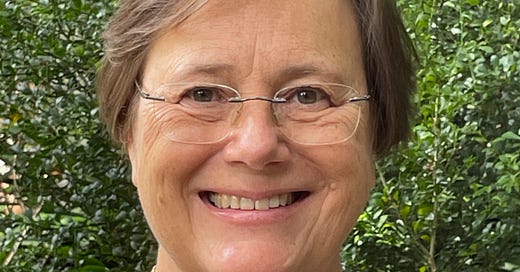Introduction:
Welcome to the Velocity Made Good Podcast. I am your host, Ted Grasela.
Today's guest is Dr Annette S. Gross, an Adjunct Associate Professor at the Sydney Pharmacy School, University of Sydney, Australia.
Annette has worked as a clinical pharmacology researcher in several universities and major teaching hospitals. She then joined GlaxoSmithKline's Research and Development department.
During her 23 years at GSK, she established and led a group in Clinical Pharmacology Modelling & Simulation that assessed the ethnic sensitivity of new drugs in development.
Annette shares her experiences with the challenges of introducing new drugs to the marketplace. Her thoughtful insights have important implications for the ongoing dialogue between pharmaceutical companies, regulatory agencies, and clinicians, particularly those in low-and middle-income countries, as new drugs are introduced to the market.
I hope that you enjoy this interview.
Biography:
Annette S. Gross BPharm (Hons) PhD
Adjunct Associate Professor,
Sydney Pharmacy School, Faculty of Medicine and Health,
University of Sydney, Australia.
Following an undergraduate degree in Pharmacy and a PhD at the University of Sydney, Australia, Annette initially worked as a clinical pharmacology researcher in academia (IKP, Stuttgart, Germany; University of Adelaide, Australia; Université d’Auvergne, France) and major teaching hospitals (Royal North Shore Hospital, Sydney) before joining GlaxoSmithKline's Research and Development department.
During 23 years at GSK, Annette established and led a group in Clinical Pharmacology Modelling & Simulation that assessed the ethnic sensitivity of new drugs in development, the implications of inter-ethnic differences in drug response for global drug development, and supported initiatives increasing the diversity of clinical trial populations.
Annette has published original research and reviews on many aspects of clinical pharmacology, primarily focusing on genetic and ethnic determinants of interindividual variation in drug metabolism and response. Annette was an Executive Editor of the British Journal of Clinical Pharmacology for 13 years and is currently an Adjunct Associate Professor at the Sydney Pharmacy School, University of Sydney, Australia.
Discussion Points & Timestamps:
You have experience in clinical pharmacology in academia, clinical care, and industry. Tell us about your career path and what led you to your interest in assessing potential inter-ethnic differences in drug response. [1:30]
Tell us about your role as Senior Director in Clinical Pharmacology at GSK. What was most interesting and challenging about your role? [4:30]
What is your experience in considering whether a new medicine's efficacy and safety profile determined in patients in one population is relevant to patients in another? What do you think about the challenge of defining ethnicity? [8:30]
Can you discuss your approach to extrapolating a new drug's efficacy and safety profile to patients not well-represented in clinical trials? [10:00]
What is the relationship between this work, pharmacovigilance, and publications that emerge from clinical research on new drugs? [14:00]
Could the information on product labels be improved? [16:00]
What do you wish Pharma R&D did better to anticipate new medicines' efficacy and safety profiles in different contexts? How do you think about differences in risk factors beyond the usual intrinsic and extrinsic factors? [18:45]
What valuable activities could clinical pharmacologists pursue in low- and middle-income countries that would effectively contribute to assessing new medicines' potential efficacy and safety profile in their local populations? [22:00]
How would you see these activities best integrated into global regulatory review? [24:00]
Do you have any last thoughts about the topics we’ve discussed or topics we haven’t covered that are important? [27:45]
Summary:
Annette’s career and experiences have tracked the growing recognition of the importance of inter-ethnic differences in drug pharmacokinetics and pharmacodynamics.
She outlines the challenges of extrapolating across patient populations, describes the importance of interdisciplinary collaboration, and emphasizes the value of a systematic approach to collecting and synthesizing information from many different sources to build a complete picture of the implications of inter-ethnic differences.
Annette points out that clinical pharmacologists in low—and middle-income countries can significantly contribute to understanding knowledge gaps and play an essential role in research to explain differences in patient outcomes. A question-based review process that includes scientists from many different settings could elicit valuable information, and a concerted effort to disseminate and use this information during regulatory review could enhance drug safety and efficacy.
Moving forward, the importance of understanding differences in response to biologics and efforts to develop individualized therapy present opportunities to expand our understanding of vital differences in drug response across patient populations.
We trust you’ll find this Velocity Made Good podcast episode insightful. We encourage you to explore the readings below for more information.
Supplemental Readings:
Gross AS, Harry AC, Clifton CS, Della Pasqua O. Clinical trial diversity: An opportunity for improved insight into the determinants of variability in drug response. Br J Clin Pharmacol. 2022; 88(6): 2700-2717. doi:10.1111/bcp.15242
Da Rocha, J. E., Othman, H., Botha, G., Cottino, L., Twesigomwe, D., Ahmed, S., Drögemöller, B. I., Fadlelmola, F. M., Machanick, P., Mbiyavanga, M., Panji, S., Wright, G. E., Adebamowo, C., Matshaba, M., Ramsay, M., Simo, G., Simuunza, M. C., Tiemessen, C. T., Baldwin, S., . . . Hazelhurst, S. (2021). The Extent and Impact of Variation in ADME Genes in Sub-Saharan African Populations. Frontiers in Pharmacology, 12, 634016. https://doi.org/10.3389/fphar.2021.634016
Singh, R., Wang, W., Chakravarty, A. et al. Simultaneous Global Drug Development and Multiregional Clinical Trials (MRCT): 5 Years After Implementation of ICH E17 Guidelines. Ther Innov Regul Sci 58, 845–854 (2024). https://doi.org/10.1007/s43441-024-00639-0
Endnote:
Remember to subscribe to the Velocity Made Good substack for updates on upcoming essays and podcasts. Your active participation is what makes this community thrive.
Finally, I would love your feedback and suggestions on the format of the Velocity Made Good podcast and thoughts on potential future guests – as together we chart a course toward better global health.
Acknowledgements:
We gratefully acknowledge Joe Brancato's generosity in allowing us to use his original composition, "Extraordinary People," as the soundtrack for the podcast.









Share this post